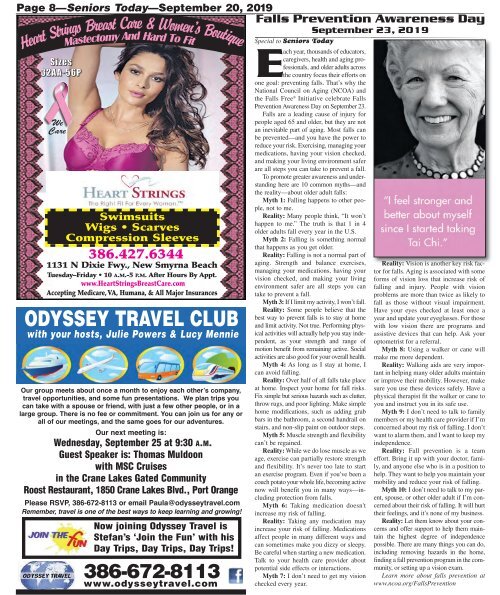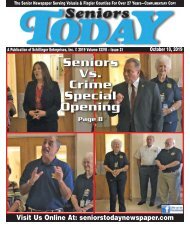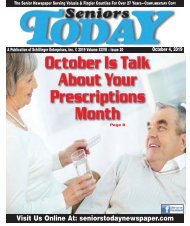Create successful ePaper yourself
Turn your PDF publications into a flip-book with our unique Google optimized e-Paper software.
Page 8—Seniors Today—<strong>September</strong> <strong>20</strong>, <strong>20</strong>19<br />
Falls Prevention Awareness Day<br />
Heart Strings Breast Care &Women’s Boutique<br />
Sizes<br />
32AA-56P<br />
We<br />
Care<br />
Mastectomy And Hard To Fit<br />
Swimsuits<br />
Wigs • Scarves<br />
Compression Sleeves<br />
386.427.6344<br />
1131 N Dixie Fwy., New Smyrna Beach<br />
Tuesday–Friday • 10 A.M.-5 P.M. After Hours By Appt.<br />
www.HeartStringsBreastCare.com<br />
Accepting Medicare, VA, Humana, & All Major Insurances<br />
ODYSSEY TRAVEL CLUB<br />
with your hosts, Julie Powers & Lucy Mennie<br />
Our group meets about once a month to enjoy each other’s company,<br />
travel opportunities, and some fun presentations. We plan trips you<br />
can take with a spouse or friend, with just a few other people, or in a<br />
large group. There is no fee or commitment. You can join us for any or<br />
all of our meetings, and the same goes for our adventures.<br />
Our next meeting is:<br />
Wednesday, <strong>September</strong> 25 at 9:30 A.M.<br />
Guest Speaker is: Thomas Muldoon<br />
with MSC Cruises<br />
in the Crane Lakes Gated Community<br />
Roost Restaurant, 1850 Crane Lakes Blvd., Port Orange<br />
Please RSVP, 386-672-8113 or email Paula@odysseytravel.com<br />
Remember, travel is one of the best ways to keep learning and growing!<br />
Now joining Odyssey Travel is<br />
Stefan’s ‘Join the Fun’ with his<br />
Day Trips, Day Trips, Day Trips!<br />
386-672-8113<br />
www.odysseytravel.com<br />
Special to Seniors Today<br />
Each year, thousands of educators,<br />
caregivers, health and aging professionals,<br />
and older adults across<br />
the country focus their efforts on<br />
one goal: preventing falls. That’s why the<br />
National Council on Aging (NCOA) and<br />
the Falls Free ® Initiative celebrate Falls<br />
Prevention Awareness Day on <strong>September</strong> 23.<br />
Falls are a leading cause of injury for<br />
people aged 65 and older, but they are not<br />
an inevitable part of aging. Most falls can<br />
be prevented—and you have the power to<br />
reduce your risk. Exercising, managing your<br />
medications, having your vision checked,<br />
and making your living environment safer<br />
are all steps you can take to prevent a fall.<br />
To promote greater awareness and understanding<br />
here are 10 common myths—and<br />
the reality—about older adult falls:<br />
Myth 1: Falling happens to other people,<br />
not to me.<br />
Reality: Many people think, “It won’t<br />
happen to me.” The truth is that 1 in 4<br />
older adults fall every year in the U.S.<br />
Myth 2: Falling is something normal<br />
that happens as you get older.<br />
Reality: Falling is not a normal part of<br />
aging. Strength and balance exercises,<br />
managing your medications, having your<br />
vision checked, and making your living<br />
environment safer are all steps you can<br />
take to prevent a fall.<br />
Myth 3: If I limit my activity, I won’t fall.<br />
Reality: Some people believe that the<br />
best way to prevent falls is to stay at home<br />
and limit activity. Not true. Performing physical<br />
activities will actually help you stay independent,<br />
as your strength and range of<br />
motion benefit from remaining active. Social<br />
activities are also good for your overall health.<br />
Myth 4: As long as I stay at home, I<br />
can avoid falling.<br />
Reality: Over half of all falls take place<br />
at home. Inspect your home for fall risks.<br />
Fix simple but serious hazards such as clutter,<br />
throw rugs, and poor lighting. Make simple<br />
home modifications, such as adding grab<br />
bars in the bathroom, a second handrail on<br />
stairs, and non-slip paint on outdoor steps.<br />
Myth 5: Muscle strength and flexibility<br />
can’t be regained.<br />
Reality: While we do lose muscle as we<br />
age, exercise can partially restore strength<br />
and flexibility. It’s never too late to start<br />
an exercise program. Even if you’ve been a<br />
couch potato your whole life, becoming active<br />
now will benefit you in many ways—including<br />
protection from falls.<br />
Myth 6: Taking medication doesn't<br />
increase my risk of falling.<br />
Reality: Taking any medication may<br />
increase your risk of falling. Medications<br />
affect people in many different ways and<br />
can sometimes make you dizzy or sleepy.<br />
Be careful when starting a new medication.<br />
Talk to your health care provider about<br />
potential side effects or interactions.<br />
Myth 7: I don’t need to get my vision<br />
checked every year.<br />
<strong>September</strong> 23, <strong>20</strong>19<br />
Reality: Vision is another key risk factor<br />
for falls. Aging is associated with some<br />
forms of vision loss that increase risk of<br />
falling and injury. People with vision<br />
problems are more than twice as likely to<br />
fall as those without visual impairment.<br />
Have your eyes checked at least once a<br />
year and update your eyeglasses. For those<br />
with low vision there are programs and<br />
assistive devices that can help. Ask your<br />
optometrist for a referral.<br />
Myth 8: Using a walker or cane will<br />
make me more dependent.<br />
Reality: Walking aids are very important<br />
in helping many older adults maintain<br />
or improve their mobility. However, make<br />
sure you use these devices safely. Have a<br />
physical therapist fit the walker or cane to<br />
you and instruct you in its safe use.<br />
Myth 9: I don’t need to talk to family<br />
members or my health care provider if I’m<br />
concerned about my risk of falling. I don’t<br />
want to alarm them, and I want to keep my<br />
independence.<br />
Reality: Fall prevention is a team<br />
effort. Bring it up with your doctor, family,<br />
and anyone else who is in a position to<br />
help. They want to help you maintain your<br />
mobility and reduce your risk of falling.<br />
Myth 10: I don’t need to talk to my parent,<br />
spouse, or other older adult if I’m concerned<br />
about their risk of falling. It will hurt<br />
their feelings, and it’s none of my business.<br />
Reality: Let them know about your concerns<br />
and offer support to help them maintain<br />
the highest degree of independence<br />
possible. There are many things you can do,<br />
including removing hazards in the home,<br />
finding a fall prevention program in the community,<br />
or setting up a vision exam.<br />
Learn more about falls prevention at<br />
www.ncoa.org/FallsPrevention





